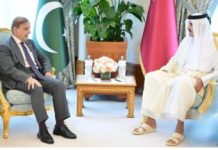DNA
ISLAMABAD: Furqat Sidikov Deputy Minister of Foreign Affairs of the Republic of Uzbekistan has highlighted the Central and South Asian Connectivity conference held in Tashkent, Uzbekistan, and stated that the conference invited dignitaries from Afghanistan, Pakistan, and other countries and the mission of this event has highlighted the importance of transport, energy and other cooperation for connectivity in this region. Results of that high-level conference were great he added.

He expressed these views during an international conference organized on, “Interconnectedness of Central and South Asia: Preconditions, Prospects, Geostrategic Significance” organized by the Senate of the Oliy Majlis of the Republic of Uzbekistan.
Khalid Taimur Akram, Executive Director, Center for Global & Strategic Studies (CGSS), Islamabad highlighted the views of Imran Khan, Prime Minister of Pakistan, who mentioned that the Tashkent conference has presented a new collaboration in geopolitics and economy that is important for the sustainable development for Central and South Asia.
Khalid Taimur Akram, stated that in July 2021 we saw the grand vision of Central and South Asia connectivity presented by President of Uzbekistan, Shavkat Mirziyoyev. In times to come the world will remember that after 5 centuries, President Shavkat Mirziyoyev brought back the idea of regional connectivity. Moreover, this time the message from Uzbekistan is a message of brotherhood, connectivity, and bringing our mutual legacy forward for the future generation.
He mentioned that the Prime Minister of Pakistan, Imran Khan was part of the historical conference in Tashkent, and Pakistan is now a major part of this initiative and concept. Furthermore, Pakistan is also a part of Central Asia-South Asia (CASA 1000), Central Asia Regional Economic Cooperation Program (CAREC). In addition to these, CPEC being the flagship project of the Belt and Road initiative is a connectivity route for the Central Asian countries as well.
He specifically mentioned the initiative of Mazar-i-Sharif-Kabul-Peshawar by President Shavkat Mirziyoyev and stated that this regional transport corridor will open new avenues of cooperation in the region and will also connect countries to the Indian Ocean.
Acknowledging the efforts of Furkat Sidikov Deputy Minister of Foreign Affairs of the Republic of Uzbekistan, he emphasized that his exemplary role in taking the bilateral ties of Pakistan and Uzbekistan is commendable.
Khalid also highlighted the efforts of Sodyq Safoev, First Deputy Chairman of the Senate of the Oliy Majlis of the Republic of Uzbekistan, and assured that Pakistan is enthusiastic for this initiative of Central & South Asia Connectivity and CGSS has already started to advocate this idea in many universities of Pakistan. He also invited future collaborations with the senate and other institutions in Uzbekistan to bring this message of Central & South Asia connectivity to future generations of Pakistan.
The international conference included dignitaries, diplomats, and experts from more than 15 countries including Pakistan, Kazakhstan, Kyrgyzstan, Japan, United States, Belgium, Russia, Germany, etc.











